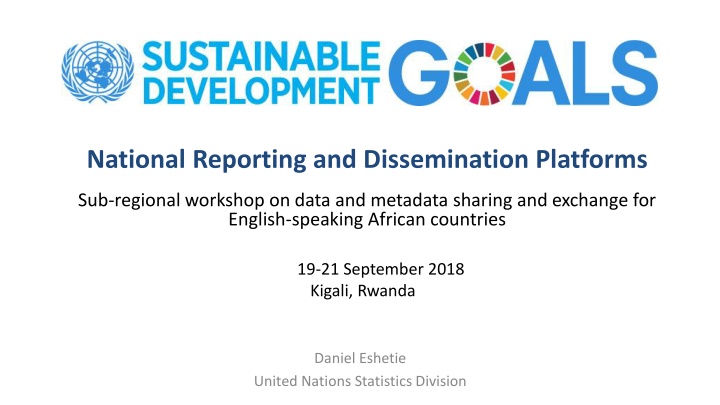
Workshop on Data and Metadata Sharing in English-Speaking African Countries
Explore the importance of National Reporting and Dissemination Platforms (NRPs) for coordinating statistical activities, supporting evidence-based policy-making, and enhancing data quality. Learn about the landscape of SDG monitoring solutions and the objectives of bringing together diverse efforts to develop sustainable reporting platforms.
Download Presentation

Please find below an Image/Link to download the presentation.
The content on the website is provided AS IS for your information and personal use only. It may not be sold, licensed, or shared on other websites without obtaining consent from the author. If you encounter any issues during the download, it is possible that the publisher has removed the file from their server.
You are allowed to download the files provided on this website for personal or commercial use, subject to the condition that they are used lawfully. All files are the property of their respective owners.
The content on the website is provided AS IS for your information and personal use only. It may not be sold, licensed, or shared on other websites without obtaining consent from the author.
E N D
Presentation Transcript
National Reporting and Dissemination Platforms Sub-regional workshop on data and metadata sharing and exchange for English-speaking African countries 19-21 September 2018 Kigali, Rwanda Daniel Eshetie United Nations Statistics Division
Importance of NRPs Providing an instrument for the coordination the statistical activities carried out by different members of the national statistical system. Coordination policy makers and all stakeholders and making SDG data available as widely as possible to support of evidence- based policy making; and reducing the response burden; Compilation Communication and dissemination Bringing together data and metadata from across the entire national statistical system (and beyond), to produce statistical outputs and analyses that are fit for purpose and abide by the highest quality standards;
Landscape different from MDG era: No common IT solutions for SDG monitoring and reporting have emerged or are on the verge of being funded and supported by international partners in all countries that require such support. Many countries are on the search for a solution, and are piloting and implementing individual solutions with the support of different international or regional partners. There is no one-size-fits-all IT solution
Objectives Learn about and bring together the currently disparate efforts of many countries, partners and solution providers; Agree on principles and guidelines to guide countries, partners and solution providers to ensure coordinated efforts and interoperable as well as sustainable solutions; Discuss statistical and technical standards that enhance interoperability, to ensure that components can be integrated and platforms be linked; A way forward and possible next steps to support countries as they develop and implement country-owned and country-driven national reporting platforms
Participation Participants: more than 60 experts from national statistical offices, international and regional organizations as well as donors and solution providers. Outcome: Draft of Principles of SDG Indicator Reporting and Dissemination Platforms and guidelines for their application. Detailed meeting report. Way forward: Principles and guidelines to be further discussed and finalized, and used by countries and partners.
What a NRP needs to be successful: Broad and continuous engagement with users, including advocacy Visibility and accessibility Country ownership and buy-in at all levels Having "core" datasets (of indicators) that are aligned with the national development priorities Statistical capacity and coordination within the national statistical system Capacity building and training Support of partners and coordination of their efforts Open data as an operating principle;
Technical considerations Interoperability of platform components and solutions as there will be multiple and overlapping systems in many countries Data life cycle process management Use of open source technologies according to countries needs Agility to technological change Metadata-driven implementation Support for localization Implementation of multi-language support for a wider adoption and use
Above all: Countries should establish their own path responding to their specific needs and context, create a community of collaboration among national data stakeholders, and should not be pushed towards specific solutions; international partners should seek an integration of their efforts.
Existing solutions: The Africa Information Highway (AIH) is the African Development Bank s (AfDB) initiative that has linked the African countries through the Open Data Platform (ODP); ArcGIS online platform as a way to achieve interoperability with other platforms; statistical and geospatial data are tightly integrated (Mexico); US/UK open source platform .Stat suite which is supported by the Statistical Information System Collaboration Community (SIS-CC) set up by the OECD Others: CKAN; SDG Tracker by DataActLab; PublishMyData by Swirrl; Data For All (DFA), by Community Systems Foundation; UNSD global dissemination platform. Presentations are available at the conference page at https://unstats.un.org/unsd/capacity-building/meetings/National_Platforms_for_SDGs
Principles: Principles: Clear institutional arrangements and management Fitness for purpose Sustainability Interoperability and statistical standards Guidelines: National Ownership. Collaboration. Multilingualism and accessibility. User- centered Design. Data Communication. Data disaggregation. Modularity and extensibility. Standardized interfaces. Scalability. Metadata. Open Data. Linked Data. Meeting report and guidelines available at: https://unstats.un.org/unsd/statcom/49th-session/documents/BG-Item3a-NRDP-E.pdf
